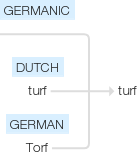Turf
Old English, of Germanic origin; related to Dutch turf and German Torf, from an Indo-European root shared by Sanskrit darbha ‘tuft of grass’.
wiktionary
From Middle English turf, torf, from Old English turf(“turf, sod, soil, piece of grass covered earth, greensward”), from Proto-West Germanic *turb, from Proto-Germanic *turbz(“turf, lawn”), from Proto-Indo-European *derbʰ-(“tuft, grass”). Cognate with Dutch turf(“turf”), Middle Low German torf(“peat, turf”) (whence German Torf and German Low German Torf), Swedish torv(“turf”), Norwegian torv(“turf”), Icelandic torf(“turf”), Russian трава(trava, “grass”), Sanskrit दर्भ(darbhá, “a kind of grass”), दूर्वा(dū́rvā, “bent grass”).
etymonline
turf (n.)
Old English turf, tyrf "slab of soil and grass, sod," also "surface of grassland," from Proto-Germanic *turfa- (source also of Old Norse torf, Danish tørv, Old Frisian turf, Old High German zurba, German Torf), from PIE root *drebh- "to wind, compress" (source also of Sanskrit darbhah "tuft of grass").
Especially "the race course," hence the turf "the profession of racing horses" (1755). French tourbe "turf" is a Germanic loan-word. The Old English plural was identical with the singular, but in Middle English turves sometimes was used. Slang meaning "territory claimed by a gang" is attested from 1953 in Brooklyn, N.Y.; earlier it had a jive talk sense of "the street, the sidewalk" (1930s), which is attested in hobo use from 1899, and before that "the work and venue of a prostitute" (1860). Turf war is recorded from 1962.
turf (v.)
early 15c., "to cover (ground) with turf," from turf (n.). Related: Turfed; turfing.
